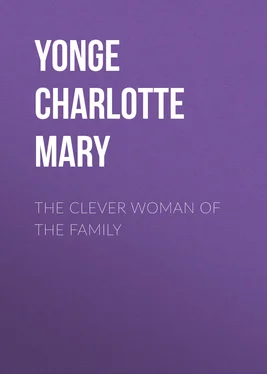Charlotte Yonge - The Clever Woman of the Family
Здесь есть возможность читать онлайн «Charlotte Yonge - The Clever Woman of the Family» — ознакомительный отрывок электронной книги совершенно бесплатно, а после прочтения отрывка купить полную версию. В некоторых случаях можно слушать аудио, скачать через торрент в формате fb2 и присутствует краткое содержание. Жанр: foreign_prose, literature_19, Европейская старинная литература, foreign_antique, на английском языке. Описание произведения, (предисловие) а так же отзывы посетителей доступны на портале библиотеки ЛибКат.
- Название:The Clever Woman of the Family
- Автор:
- Жанр:
- Год:неизвестен
- ISBN:нет данных
- Рейтинг книги:4 / 5. Голосов: 1
-
Избранное:Добавить в избранное
- Отзывы:
-
Ваша оценка:
- 80
- 1
- 2
- 3
- 4
- 5
The Clever Woman of the Family: краткое содержание, описание и аннотация
Предлагаем к чтению аннотацию, описание, краткое содержание или предисловие (зависит от того, что написал сам автор книги «The Clever Woman of the Family»). Если вы не нашли необходимую информацию о книге — напишите в комментариях, мы постараемся отыскать её.
The Clever Woman of the Family — читать онлайн ознакомительный отрывок
Ниже представлен текст книги, разбитый по страницам. Система сохранения места последней прочитанной страницы, позволяет с удобством читать онлайн бесплатно книгу «The Clever Woman of the Family», без необходимости каждый раз заново искать на чём Вы остановились. Поставьте закладку, и сможете в любой момент перейти на страницу, на которой закончили чтение.
Интервал:
Закладка:
“I don’t mind that,” said Conrade, stoutly; “let her try!”
“Oh, but she wanted mamma to shut you up,” added Francis.
“Well, and mamma knows better,” said Conrade, “and it made her leave off teaching me, so it was lucky. But I don’t mind that; only don’t you see, Colonel, they don’t know how to treat mamma! They go and bully her, and treat her like—like a subaltern, till I hate the very sight of it.”
“My boy,” said the Colonel, who had been giving only half attention; “you must make up your mind to your mother not being at the head of everything, as she used to be in your father’s time. She will always be respected, but you must look to yourself as you grow up to make a position tor her!”
“I wish I was grown up!” sighed Conrade; “how I would give it to Aunt Rachel! But why must we live here to have her plaguing us?”
Questions that the Colonel was glad to turn aside by moans of the ponies, and by a suggestion that, if a very quiet one were found, and if Conrade would be very careful, mamma might, perhaps, go out riding with them. The motion was so transcendant that, no sooner had the ponies been seen, than the boys raced home, and had communicated it at the top of their voices to mamma long before their friend made his appearance. Lady Temple was quite startled at the idea. “Dear papa,” as she always called her husband, “had wished her to ride, but she had seldom done so, and now—” The tears came into her eyes.
“I think you might,” said the Colonel, gently; “I could find you a quiet animal, and to have you with Conrade would be such a protection to him,” he added, as the boys had rushed out of the room.
“Yes; perhaps, dear boy. But I could not begin alone; it is so long since I rode. Perhaps when you come back from Ireland.”
“I am not going to Ireland.”
“I thought you said—” said Fanny looking up surprised; “I am very glad! But if you wished to go, pray don’t think about us! I shall learn to manage in time, and I cannot bear to detain you.”
“You do not detain me,” he said, sitting down by her; “I have found what I was going in search of, and through your means.”
“What—what do you mean! You were going to see Miss Williams this afternoon, I thought!”
“Yes, and it was she whom I was seeking.” He paused, and added slowly, as if merely for the sake of dwelling on the words, “I have found her!”
“Miss Williams!” said Fanny, with perplexed looks.
“Miss Williams!—my Ermine whom I had not seen since the day after her accident, when we parted as on her deathbed!”
“That sister! Oh, poor thing, I am so glad! But I am sorry!” cried the much confused Fanny, in a breath; “were not you very much shocked?”
“I had never hoped to see her face in all its brightness again,” he said. “Twelve years! It is twelve years that she has suffered, and of late she has been brought to this grievous state of poverty, and yet the spirit is as brave and cheerful as ever! It looks out of the beautiful eyes—more beautiful than when I first saw them,—I could see and think of nothing else!”
“Twelve years!” repeated Fanny; “is it so long since you saw her?”
“Almost since I heard of her! She was like a daughter to my aunt at Beauchamp, and her brother was my schoolfellow. For one summer, when I was quartered at Hertford, I was with her constantly, but my family would not even hear of the indefinite engagement that was all we could have looked to, and made me exchange into the —th.”
“Ah! that was the way we came to have you! I must tell you, dear Sir Stephen always guessed. Once when he had quite vexed poor mamma by preventing her from joking you in her way about young ladies, he told me that once, when he was young, he had liked some one who died or was married, I don’t quite know which, and he thought it was the same with you, from something that happened when you withdrew your application for leave after your wound.”
“Yes! it was a letter from home, implying that my return would be accepted as a sign that I gave her up. So that was an additional instance of the exceeding kindness that I always received.”
And there was a pause, both much affected by the thought of the good old man’s ever ready consideration. At last Fanny said, “I am sure it was well for us! What would he have done without you?—and,” she added, “do you really mean that you never heard of her all these years?”
“Never after my aunt’s death, except just after we went to Melbourne, when I heard in general terms of the ruin of the family and the false imputation on their brother.”
“Ah! I remember that you did say something about going home, and Sir Stephen was distressed, and mamma and I persuaded you because we saw he would have missed you so much, and mamma was quite hurt at your thinking of going. But if you had only told him your reason, he would never have thought of standing in your way.”
“I know he would not, but I saw he could hardly find any one else just then who knew his ways so well. Besides, there was little use in going home till I had my promotion, and could offer her a home; and I had no notion how utter the ruin was, or that she had lost so much. So little did I imagine their straits that, but for Alison’s look, I should hardly have inquired even on hearing her name.”
“How very curious—how strangely things come round!” said Fanny; then with a start of dismay, “but what shall I do? Pray, tell me what you would like. If I might only keep her a little while till I can find some one else, though no one will ever be so nice, but indeed I would not for a moment, if you had rather not.”
“Why so? Alison is very happy with you, and there can be no reason against her going on.”
“Oh!” cried Lady Temple, with an odd sound of satisfaction, doubt, and surprise, “but I thought you would not like it.”
“I should like, of course, to set them all at ease, but as I can do no more than make a home for Ermine and her niece, I can only rejoice that Alison is with you.”
“But your brother!”
“If he does not like it, he must take the consequence of the utter separation he made my father insist on,” said the Colonel sternly. “For my own part, I only esteem both sisters the more, if that were possible, for what they have done for themselves.”
“Oh! that is what Rachel would like! She is so fond of the sick—I mean of your—Miss Williams. I suppose I may not tell her yet.”
“Not yet, if you please. I have scarcely had time as yet to know what Ermine wishes, but I could not help telling you.”
“Thank you—I am so glad,” she said, with sweet earnestness, holding out her hand in congratulation. “When may I go to her? I should like for her to come and stay here. Do you think she would?”
“Thank you, I will see. I know how kind you would be—indeed, have already been to her.”
“And I am so thankful that I may keep Miss Williams! The dear boys never were so good. And perhaps she may stay till baby is grown up. Oh! how long it will be first!”
“She could not have a kinder friend,” said the Colonel, smiling, and looking at his watch.
“Oh, is it time to dress? It is very kind of my dear aunt; but I do wish we could have stayed at home to-night. It is so dull for the boys when I dine out, and I had so much to ask you. One thing was about that poor little Bessie Keith. Don’t you think I might ask her down here, to be near her brother?”
“It would be a very kind thing in you, and very good for her, but you must be prepared for rather a gay young lady.”
“Oh, but she would not mind my not going out. She would have Alick, you know, and all the boys to amuse her; but, if you think it would be tiresome for her, and that she would not be happy, I should be very sorry to have her, poor child.”
Читать дальшеИнтервал:
Закладка:
Похожие книги на «The Clever Woman of the Family»
Представляем Вашему вниманию похожие книги на «The Clever Woman of the Family» списком для выбора. Мы отобрали схожую по названию и смыслу литературу в надежде предоставить читателям больше вариантов отыскать новые, интересные, ещё непрочитанные произведения.
Обсуждение, отзывы о книге «The Clever Woman of the Family» и просто собственные мнения читателей. Оставьте ваши комментарии, напишите, что Вы думаете о произведении, его смысле или главных героях. Укажите что конкретно понравилось, а что нет, и почему Вы так считаете.












